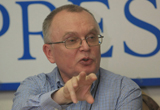 It took time to think about what happened which is why I am writing about this event a while after it occurred. The shock was hard, and I felt I needed to speak with my friends, in the hope of understanding it.
It took time to think about what happened which is why I am writing about this event a while after it occurred. The shock was hard, and I felt I needed to speak with my friends, in the hope of understanding it.
If you watch what is going in Russia you know that Russia is definitely different to other countries. The number of new billionaires keeps increasing, healthcare and education budgets are scarce, the healthcare system is irrational, expenditure on weapons is going up, there is a culture of xenophobia—specifically anti American and anti UK sentiment, and there is support for regimes like those in Libya, Iran, and Syria.
The Society for Evidence Based Medicine, which I am a president of, has for many years tried to draw attention to the irrational spending decisions made by the Russian Government, and it has also tried to amend bad draft laws. Recently the prospect of a discussion with the government about our healthcare system was proposed. There is an urgent need for this discussion, because the government insists that the situation is not bad and quickly improving, but most healthcare professionals believe that it is awful and worsening. Being in charge at the Society for Evidence Based Medicine, I started to look for potential participants for the meeting. I hoped to find people who are knowledgeable enough about the different aspects of the healthcare and, at the same time, ready to speak openly about the problems and suggest some much needed solutions.
I approached a number of people who I know in the Society for Evidence Based Medicine and elsewhere, and to my surprise I found that almost all doctors did not want to participate in the meeting, because they felt that they would not be free to speak honestly. They were afraid that they would be persecuted by their bosses in their institutions for speaking critically of the government. Disappointed with this result, I decided to go to the place where free people go—to a meeting held by the opposition.
I prepared a poster with these words: “Looking for a doctor.” I decided to keep the message short to remind people of the “Hominem quaero!” call. I went to the meeting on a Sunday and stood for two hours at the most visible place near the entrance to the square reserved for the meeting. You can see me in this photo in a yellow jacket.
Of course, you may wonder why there is a poster behind me in the shape of a condom. Six months ago the opposition was outraged by the unfair and false way that the elections to the State Duma (lower chamber of Russian legislative body) were carried out. They selected a symbol for the movement for democracy and free election– the white ribbon. Putin was angry with the opposition and said that “these people” are probably against AIDS and they probably wear the used condoms as a symbol. After this, the major theme of the opposition’s posters became Putin and condoms. If you look at other posters on this webpage, you will find a number of posters picturing Putin and condoms. On the biggest poster at the entrance to the square the text says: “I am for repeated uses. V. Putin.”
So, I stood for two hours in the cold, and do you know how many doctors contacted me? Zero. I was approached by about 20 people who wondered why I was looking for a doctor. I talked to them, and asked them to help, but to no avail. More than 20 000 people passed me, but not a single doctor.
During these two hours I enjoyed being among nice people, and had plenty of time to think about what is happening. I was reminded that in many countries and at many times doctors were amongst the most “collaborative” parts of society—for example in Nazi Germany the proportion of NSDAP members was highest amongst doctors. I cannot remember the name of a single dissident in the USSR who was a doctor. In the Perestroika years not a single doctor became a visible leader of change. Nowadays doctors are in “silent opposition”—as one doctor from Siberia said. Why do doctors behave like this? They are not well paid—actually in Russia and Ukraine doctors’ wages are lower than the average wage in the country. They do not enjoy any special recognition in society. Yes, they belong to the educated part of the society, but Russian opposition these days is the opposition of the educated middle class.
So why doctors don’t speak up? If you say that there is something wrong with only Russian doctors, I would not have embraced this idea from the start. There are examples of doctors who have become leaders for change, but they are rare exceptions, everywhere in the world.
Vasiliy Vlassov is a Professor of medicine at the Higher School of Economics, Moscow. His research interests are in epidemiology, evaluation of diagnostic tests, public health, and especially health care delivery with scarce resources. He is the co-founder and current president of the Russian Society for Evidence Based Medicine.
